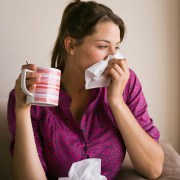HIV is the virus that causes AIDS. HIV weakens your body's defense system, which makes it hard for your body to fight off other health problems that it could normally resist. As time goes on, your body becomes less able to fight off diseases.
Today, women account for about 1 in 4 new HIV/AIDS cases in the United States. Of these newly infected women, about 2 in 3 are African-American. Most of these women got HIV from having unprotected sex with a man.
Some reasons why African-American women are affected by HIV/AIDS more than women of other races include:
- Poverty — One in 4 African-American women lives in poverty, which is strongly linked to HIV risk. People living in poverty also get lower-quality health care in general, which can mean advancing from HIV infection to AIDS more quickly.
- Sexually transmitted infections (STIs) — HIV is most commonly spread to women through sexual contact. Untreated STIs that break the skin, such as genital herpes, give HIV easy access into the bloodstream. African-American women have high rates of many STIs.
- The number of people living with HIV (prevalence) in African-American communities and the fact that African-Americans are more likely to have sex with partners of the same race (compared to other groups) means that African-Americans face a greater risk of HIV infection with each new sexual encounter.
- Stigma, fear, discrimination, homophobia, and negative perceptions about HIV testing can also place too many African-American women at higher risk. Many at risk for infection fear stigma more than infection. They may choose instead to hide their high-risk behavior rather than get counseling and testing.
- Lack of awareness of HIV status can affect HIV rates. Approximately 1 in 5 adults and adolescents in the U.S. living with HIV don’t know their HIV status. This translates to about 116,750 persons in the African-American community.
Late diagnosis of HIV infection is common, which creates missed opportunities to obtain early medical care and prevent transmission to others. The sooner an individual is diagnosed and linked to appropriate care, the better the outcome.
All people should know their HIV status. The only sure way to know if you have HIV is to get tested. That's because you can have HIV and still feel healthy. Once you know your status, you can take steps to protect yourself and stop the spread of HIV:
- Use latex condoms every time you have any kind of sex (vaginal, oral, or anal).
- If you inject drugs and cannot or will not stop, do not share needles, syringes, or other items used to prepare drugs. Always use new, sterile syringes and needles. If you cannot get new ones, clean used ones with full-strength household bleach after each use. After unprotected sex, injection drug use is the next most common way that HIV is spread.
- Be faithful. Only have sex with an uninfected partner who only has sex with you.
Another way HIV is spread is from an infected mother to her baby during pregnancy or delivery. Because many people who are infected with HIV don't know they have it, all newly pregnant women should be tested for HIV as early in the pregnancy as possible, even if they are at low risk. With early prenatal care and treatment, many babies of HIV-positive mothers do not get HIV.
More resources on minority women's health





